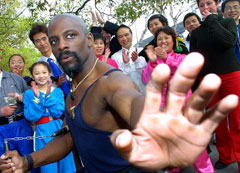5 steps to better education in China
By MichaelM (blog.chinadaily.com.cn) Updated: 2014-08-26 16:00I post a lot about education, learning English and the schools where all of this happens. I will usually never voice (speak about) a problem unless I also hear it from Chinese people (especially Chinese teachers). Here's a short list of 5 things that I believe should happen in Chinese education.
1. Change the mindset that 'harder is better' - This seems to be as much of a cultural mindset in China and not just in education. 'Suffering' is seen as honorable and is often initiated by decisions to, well, suffer. It makes no sense why one would choose to suffer rather than find a way to alleviate suffering and discover better ways of doing something.
In school, there is no virtue (good) in making students suffer. In the West, we expect the best resources that are available for educating children. Our schools are comfortable (air conditioned where needed), clean and have the latest technology such as quality Smart Boards, multimedia, Internet connections, science labs and whatever else is available to enhance the education of children. I hear people here in China say, "Yeah, but you're so rich in the West." The fact is, more than 99% of K-12th grade education is publicly funded. Meaning, it is FREE for students to attend. It is funded by the government and is it not a 'for profit' situation as many schools (particularly high schools) are here in China. More homework, longer hours in the classroom, ineffective rote memory systems and lack of resources are not beneficial in educating children. Yet, these are too often the case here in China.
2. Education in the West is desired by most Chinese students. Therefore, this suggestion is that if most Chinese believe that Western education is better than Chinese, then, study the schools in the West and adopt what they do. The West gets blamed for many negative things that they export to other countries like fast food, unsuitable television shows, unsuitable movies and fashion. However, the West also exports jobs, technology, industry and other societal advancements.
3. Get parents involved. A lady knocked on my door recently and asked me to teach her 11-year-old boy English. I asked how much English education he's had thus far. She said that he hasn't had any. I asked, "Why not?" She said that she works in another city and her husband is too busy working (making money). The boy is cared for by his aging grandparents and they don't really know how to handle him and properly direct him in his education. I set her son up for private tutoring three times a week and one English training class per week. When I told her that she is the most important person in her son's education, she nearly started crying. Nonetheless, the parent IS the most important person in a child's education. Teachers come AFTER parents. No one can influence an 11-year-old boy more than his mother and father.











